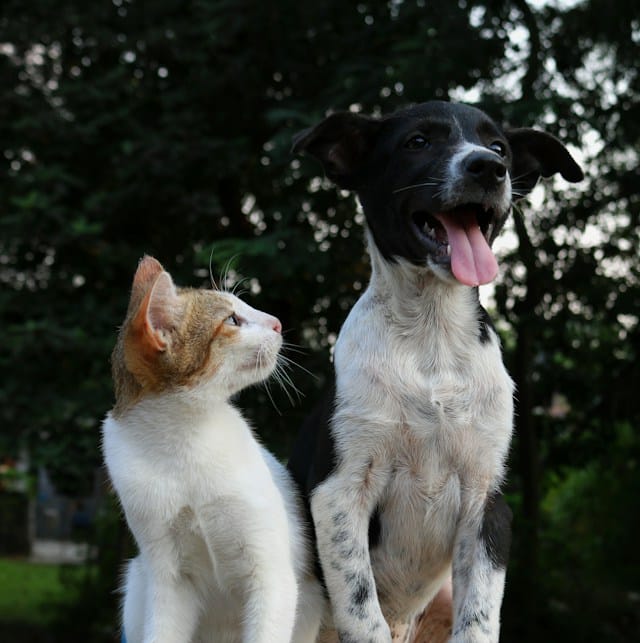Feline friends can be quite the mystery, their elusive behaviour often raising more questions than answers. Among these, one of the most critical for any pet owner is: Can my cat feel anxiety? Indeed, cats can experience anxiety, and it can severely affect their overall health and behavior. Understanding the signs of stress, contributing factors, and how to help your cat navigate through its anxiety is a crucial aspect of maintaining their wellbeing. This article aims to shed light on cat anxiety, its symptoms, causes, and possible intervention measures.
Recognizing Signs of Anxiety in Cats
Anxiety in cats is not always apparent. Felines are famously stoic creatures, often masking their discomfort or fear. However, some subtle signs might indicate that your pet is feeling anxious.
Dans le meme genre : How to Introduce a New Puppy to a Household with an Aging Cat?
Changes in behavior are often the first signal. An anxious cat may exhibit changes in its eating or sleeping patterns. It may become more aggressive, withdrawn or start avoiding specific areas or people. Changes in grooming habits can also be an indicator; an anxious cat might excessively groom or, conversely, neglect its grooming altogether.
Physical symptoms are another indication of anxiety. These can include pacing, trembling, and unexplained weight loss or gain. If your cat starts to exhibit any of these signs or any other uncharacteristic behavior, it is a clear signal that something is amiss. Their stress levels might be higher than normal.
A voir aussi : The basics of parrot speech training
While it can be challenging to discern the root cause of these symptoms, keeping a close eye on your cat’s behavior and interactions can help identify the source of their anxiety.
Causes of Anxiety in Cats
Just like humans, cats can develop anxiety for various reasons. The trigger could be as simple as a change in the environment or something more complex like a traumatic event.
One common cause is separation anxiety. Cats are creatures of habit, and any change in their routine can distress them. If you recently started spending less time at home, your cat might feel abandoned, leading to feelings of anxiety.
Similarly, changes in the household, such as moving to a new location, getting a new pet (like a dog), or introducing a new family member, can cause stress in your feline. Cats are territorial animals, and any disturbance in their environment can lead to anxiety.
Health issues can also be a cause. If your cat is feeling unwell, it may start to exhibit signs of anxiety. Certain medical conditions can make them feel vulnerable, leading to a heightened sense of fear.
How to Help Your Anxious Cat
Providing a safe, comfortable environment for your cat can significantly reduce their anxiety levels. This could mean providing a safe space where they can retreat when they feel threatened or stressed.
Socializing your cat from a young age can also be beneficial. This can help them feel more comfortable around people and other pets, reducing the chances of developing fear-induced anxiety.
While it can be tempting to comfort your cat when they show signs of anxiety, it’s essential not to reinforce their fears. Instead, try to redirect their attention with a favorite toy or treat.
In more severe cases, you may want to consult with a vet. They can provide professional advice and may even prescribe anti-anxiety medication if necessary.
Professional Intervention for Cat Anxiety
If your cat’s anxiety persists despite your best efforts, it’s time to seek professional help. A vet can perform a thorough examination to rule out any underlying health issues. If a medical condition is causing your cat’s anxiety, addressing it will likely alleviate the anxiety symptoms.
In some cases, your vet may recommend a behavioral therapist. These professionals are trained in dealing with anxiety in pets and can offer strategies to help manage your cat’s fears.
Regardless of the course of action, it’s essential to address the issue head-on. Cat anxiety can have severe long-term effects on your pet’s health and happiness. By recognizing the signs and taking steps to alleviate their stress, you can ensure that your feline friend leads a happier, healthier life.
Dealing with Anxiety in Cats: Practical Strategies
Understanding the signs and causes of anxiety in cats is only half the battle. The other part involves implementing strategies to help alleviate the stress, maintaining your feline friend’s mental health.
For instance, cats with separation anxiety benefit from a predictable routine. Try to stick to regular feeding and play times, and maintain a consistent presence at home. If this isn’t possible due to work or other commitments, consider getting a pet sitter or using an interactive pet camera to keep an eye on your cat and interact with them while you’re away.
Another important aspect is the environment. Cats are territorial creatures, so it’s crucial to make them feel secure in their surroundings. Maintain a quiet, calm home environment, and make sure your cat has access to safe hiding spots where they can retreat when feeling threatened or stressed.
Proper litter box care can also help reduce anxiety. Cats are very particular about cleanliness, so make sure the litter box is always clean. Place it in a quiet, safe location where your cat won’t be disturbed.
For cats that exhibit signs of anxiety due to changes in the household, gradual introduction can help. This could mean slowly introducing a new pet over a few weeks or getting your cat used to a new home before moving.
Above all, patience and understanding are key. It can take time for your cat to adjust to changes or overcome their fears.
Long-Term Management and Conclusion
In some cases, anxiety in cats may require long-term management strategies. In these situations, professional intervention becomes a necessity. This could mean regular visits to a vet or behavioral therapist, and in some cases, medication may also be necessary to manage the symptoms of anxiety.
Medication should always be a last resort, used only when all other options have been exhausted and under the close supervision of a vet. Just like in humans, medication can have side effects, and it’s crucial to balance the benefits with the potential risks.
Be open to trying various strategies to manage your cat’s anxiety. What works for one cat may not work for another, and it may take some trial and error to find the most effective approach for your feline friend.
In conclusion, cat anxiety is a real and concerning issue that can affect your pet’s overall health and happiness. It’s crucial to recognize the signs of anxiety early, understand the potential causes, and take steps to alleviate the stress. Whether that means creating a safe environment, maintaining a consistent routine, seeking professional help, or a combination of these, your dedication can make a world of difference in your cat’s life. Remember, a happy cat is a healthy cat, and a healthier cat will undoubtedly bring more joy into your life as well.
















